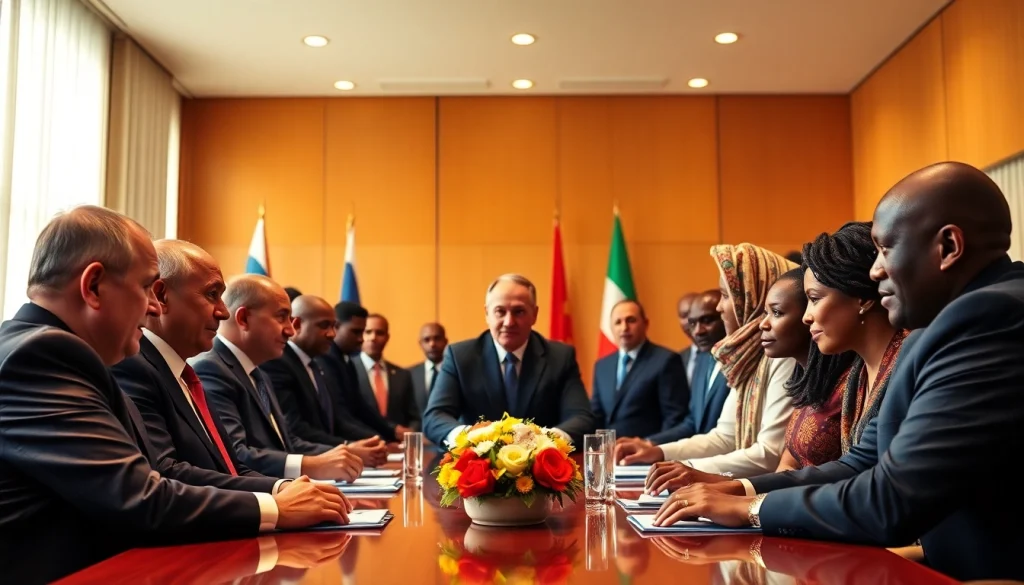Strengthening Russia Africa Relations: Collaborative Strategies for Growth and Development

Understanding Russia Africa Relations
The relationship between Russia and African nations is evolving rapidly, underpinned by historic ties and a contemporary drive towards mutualism. With the growing interest from African countries in Russia Africa relations, this article seeks to explore the depth and scope of these connections, encompassing the historical context, current diplomatic efforts, and key players involved in this partnership.
Historical Context
Russia’s engagement with Africa dates back to the days of the Soviet Union, where it provided support to liberation movements across the continent during the Cold War. Russia’s ideological stance was against colonialism, leading to significant partnerships with various African nations. These historical alliances have paved the way for contemporary political and economic relationships, with Russia aiming to recapture the influence it once had in the region.
Current Diplomatic Efforts
In recent years, Russia has undertaken various diplomatic initiatives to reinforce its presence in Africa. The Russia-Africa Summit, held in Sochi in 2019, marked a significant commitment to strengthening relations through economic cooperation, military collaboration, and cultural ties. During this summit, President Vladimir Putin outlined Russia’s vision for collaboration in various sectors, emphasizing respect for African sovereignty and the need for a cooperative approach in resolving conflicts on the continent.
Key Players in the Partnership
Several key players are at the forefront of enhancing Russia’s ties with African countries. Russian corporations such as Rosneft and Alrosa are heavily involved in Africa’s resource sector, particularly in oil and diamond extraction. Additionally, lending institutions like the BRICS New Development Bank are also increasingly engaged in funding projects in various African nations. Military cooperation is another significant aspect of this relationship, with private military companies like Wagner Group offering services to several governments across Africa, often amidst contentious political climates.
Economic Opportunities in Russia Africa Relations
Economic collaboration between Russia and Africa is rooted in the region’s vast resources and the growing demand for investment. The array of opportunities ranges from trade agreements to investment prospects across multiple sectors.
Trade Agreements and Initiatives
The establishment of trade agreements has been a priority for both sides. Initiatives aimed at increasing trade volume include the African Continental Free Trade Area (AfCFTA), which is designed to eliminate barriers to trading among African countries and could enhance trade with Russia as well. Russia has been keen to export military hardware, agricultural products, and technology, while seeking minerals and resources that are abundant on the continent.
Investment Prospects in Key Sectors
There are numerous investment opportunities in sectors such as agriculture, mining, energy, and infrastructure development. For instance, Russia has increased its investments in pharmaceutical production, aiming to address Africa’s healthcare challenges. The African Energy Chamber estimates that Africa will need approximately $45 billion each year for infrastructure development, pushing for investments from countries like Russia to meet these needs effectively.
Challenges Affecting Economic Ties
Despite the growing economic ties, several challenges remain. Corruption, political instability, and the lack of infrastructure hinder effective investment. Additionally, competition from Western nations and China also complicates Russia’s endeavors. Building trust and establishing transparent agreements will be crucial in overcoming these obstacles. Localizing investments and ensuring collaborative development initiatives can also help mitigate these risks.
Cultural Exchange and Collaboration
Cultural ties complement the political and economic dimensions of Russia-Africa relations. Cultural exchange programs enhance mutual understanding and support the development of humanitarian projects across the continent.
Educational Programs and Partnerships
Education is a critical area for collaboration. Russia has extended scholarships to thousands of African students, providing education in various fields such as engineering, natural sciences, and medicine. Establishing partnerships between Russian and African universities fosters knowledge transfer and innovation. Programs like the “Africa is Our Home” initiative exemplify this commitment to educational exchange, enhancing the skills of future leaders on the continent.
Artistic and Cultural Synergies
Cultural diplomacy through art and music has also been emphasized. Initiatives showcasing Russian art, literature, and cinema in African countries aim to promote cultural synergy while fostering appreciation for each other’s heritage. These exchanges not only spark interest in mutual cultures but also open avenues for collaborative artistic projects that can lead to greater societal impacts.
Impact on Local Communities
The positive impacts of cultural exchange initiatives resonate at the community level, promoting social cohesion and enhancing local identity. Programs that integrate local traditions and practices into Russian cultural programs create a sense of ownership among local populations, fostering pride and preserving cultural heritage against globalization pressures.
Security and Military Cooperation
As geopolitical dynamics shift, security ties between Russia and African nations are becoming increasingly significant. Addressing security threats through military cooperation is one of the key pillars of their relationship.
Joint Military Exercises and Training Programs
Joint military exercises conducted between Russian and African forces serve as platforms to enhance operational capacities. Increased Russian military training for African personnel underscores a commitment to supporting local defense capabilities while fostering meaningful military collaboration. Nations like Egypt and South Africa have engaged in joint exercises covering counter-terrorism, peacekeeping, and disaster response operations.
Addressing Security Challenges Together
Russia’s partnerships aim to address shared security challenges, including terrorism in the Sahel region, piracy off the coast of Somalia, and general civil unrest. Through military cooperation, African nations now have access to advanced military technologies and strategies that enhance their ability to combat these threats effectively.
Future of Military Relations
The future of military cooperation between Russia and Africa is promising yet complex. Russia is likely to continue leveraging military relationships as a means to expand its influence on the continent, while African nations may view these alliances as opportunities for capacity building against external threats. Establishing frameworks that focus on long-term partnerships and sustainable peace will be essential.
Future Outlook for Russia Africa Relations
Looking ahead, the trajectory of Russia-Africa relations appears to be one of increasing collaboration and mutual benefit. However, it is also fraught with challenges that require careful navigation. Emerging trends and opportunities in this relation can redefine power dynamics in the region.
Emerging Trends and Predictions
As the geopolitical landscape evolves, trends suggest a pivot towards multi-faceted partnerships that emphasize economic sovereignty and self-reliance. The emphasis on sectors such as technology, healthcare, and energy indicates that both sides will prioritize deeper collaboration tailored to contemporary realities. Furthermore, participation in organizations like BRICS may foster broader intercontinental cooperation that benefits both regions.
Continuing Challenges and Opportunities
Challenges such as political instability and regional conflicts will persist. However, Russia and African nations can seek to leverage opportunities for collaboration in sectors like climate change and sustainable development. Addressing shared global challenges, such as food security or health crises exemplified by the COVID-19 pandemic, will be pivotal in cementing long-term relationships.
Strategic Vision for the Next Decade
A strategic vision focusing on technology transfer, infrastructural development, and healthcare innovation can strengthen ties over the next decade. Russia’s willingness to adopt a flexible and adaptive approach to meet the unique needs of African countries can foster mutual growth and development. By fostering partnership frameworks that prioritize youth and education, Russia can embed itself into the socio-economic fabric of African nations, paving the way for a truly enduring and mutually beneficial relationship.





